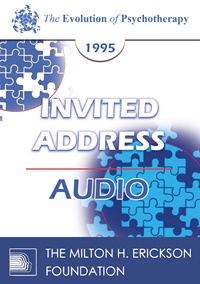
- Average Rating:
- Not yet rated
- Topic Areas:
- Invited Addresses | Ericksonian Hypnosis and Therapy Techniques | History of Psychotherapy | Hypnotherapy | Psychotherapy
- Categories:
- Evolution of Psychotherapy | Evolution of Psychotherapy 1995
- Faculty:
- Ernest Rossi, PhD | Eugene Gendlin, PhD
- Duration:
- 1 Hour 31 Minutes
- Format:
- Audio Only
- Original Program Date:
- Dec 14, 1995
- Short Description:
- The evolution of psychotherapeutic methods over the past 200 years from Mesmer through the psychoanalytic schools, behaviorism and current cognitive psychology tells a fascinating tale of our evolving understanding of human nature. In this address we will trace the development of fundamental techniques such as suggestion, free association, active imagination, gestalt dialogue, focusing, Erickson's indirect approaches and what I now call "The Basic Accessing Question."
- Price:
- $15.00 - Base Price
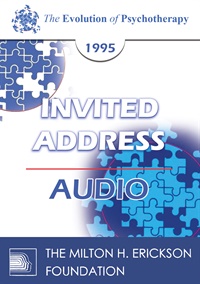
- Average Rating:
- Not yet rated
- Topic Areas:
- Invited Addresses | Cognitive Behavior Therapy (CBT) | Psychotherapy | Anxiety | Depression | Panic
- Categories:
- Evolution of Psychotherapy | Evolution of Psychotherapy 1995
- Faculty:
- Aaron Beck, MD | Salvador Minuchin, MD
- Duration:
- 1 Hour 31 Minutes
- Format:
- Audio Only
- Original Program Date:
- Dec 14, 1995
- Short Description:
- Cognitive therapy was originally developed for the treatment of Depression and Anxiety. Since its early beginnings various clinicians and investigators have extended its use to a wide variety of disorders and populations. Systematic outcome studies have demonstrated its efficacy not only in the garden variety of disorders such as Depression, Anxiety and Panic but also in medical disorders such a low back pain, diabetes, chronic fatigue syndrome and chronic hypertension.
- Price:
- $15.00 - Base Price
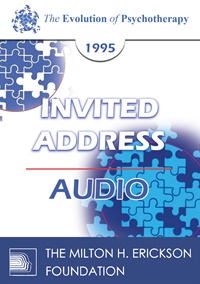
- Average Rating:
- Not yet rated
- Topic Areas:
- Invited Addresses | Psychotherapy | Solution Oriented Approach | Brief Therapy
- Categories:
- Evolution of Psychotherapy | Evolution of Psychotherapy 1995
- Faculty:
- Arnold Lazarus, Ph.D. | Donald Meichenbaum, PhD
- Duration:
- 1 Hour 23 Minutes
- Format:
- Audio Only
- Original Program Date:
- Dec 14, 1995
- Short Description:
- Anyone can perform brief or short-term therapy, but unless pivotal issues are addressed, the treatment will, at best, be too narrow and restricted. It is essential to employ empirically established methods whenever possible, but also to have a framework and rationale for on-the-spot inventiveness. This Invited Address will explain how to be precise and targeted while also ensuring that interactive healing processes are put into effect.
- Price:
- $15.00 - Base Price
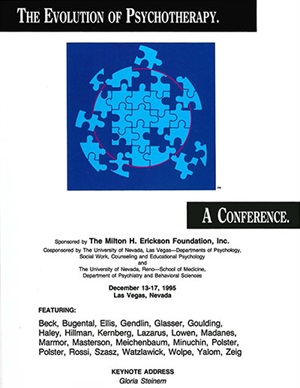
- Average Rating:
- Not yet rated
- Topic Areas:
- Invited Addresses | History of Psychotherapy | Psychotherapy
- Categories:
- Evolution of Psychotherapy | Evolution of Psychotherapy 1995
- Faculty:
- Judd Marmor | Jay Haley, MA
- Duration:
- 1 Hour 28 Minutes
- Format:
- Audio Only
- Original Program Date:
- Dec 14, 1995
- Short Description:
- The author traces the evolution of psychodynamic theory over the past fifty years and demonstrates how various individuals and schools of thought have contributed to increasing conceptual clarity despite significant continuing differences. Along with these theoretical advances, there have been important changes in analytically-oriented therapeutic techniques.
- Price:
- $15.00 - Base Price
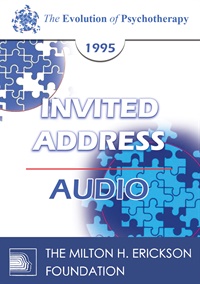
- Average Rating:
- Not yet rated
- Topic Areas:
- Invited Addresses | Psychoanalysis | Anxiety | Psychotherapy | Research
- Categories:
- Evolution of Psychotherapy | Evolution of Psychotherapy 1995
- Faculty:
- Albert Ellis, PhD | Joseph Wolpe, M.D.
- Duration:
- 1:31:10
- Format:
- Audio Only
- Original Program Date:
- Dec 14, 1995
- Short Description:
- In the early decades of the 20th century Freud's mastery of the craft of presenting a case enthroned a belief that anxiety disorders were caused by repressed emotional complexes and that recovery required the restitution of repressed ideas. This belief dominated psychotherapeutic practice, and even though little was to be seen in the way of success, any alternative was treated with scorn. Mid-century studies of experimental neuroses showed that these disturbances were the consequence of the learning of maladaptive anxiety and could be overcome by systematic counteraction by other emotions.
- Price:
- $15.00 - Base Price
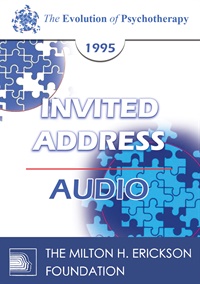
- Average Rating:
- Not yet rated
- Topic Areas:
- Invited Addresses | Psychoanalysis | Psychotherapy
- Categories:
- Evolution of Psychotherapy | Evolution of Psychotherapy 1995
- Faculty:
- Otto Kernberg, MD | Thomas Szasz, MD
- Duration:
- 1 Hour 25 Minutes
- Format:
- Audio Only
- Original Program Date:
- Dec 16, 1995
- Short Description:
- The major emphasis in contemporary psychoanalytic psychotherapy is on the early and consistent interpretation of the transference. A growing attention to countertransference analysis, to the risk of "indoctrinating" patients, to character analysis, to the analysis of unconscious meanings in the "here and now" also are dominant trends. Significant controversies continue regarding the importance of the "real" relationship, the therapeutic versus the resistant aspects of regression, the role of empathy, and the relation of historical to narrative truth.
- Price:
- $15.00 - Base Price
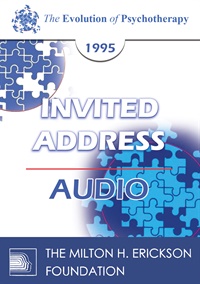
- Average Rating:
- Not yet rated
- Topic Areas:
- Invited Addresses | Psychotherapy | History of Psychotherapy | Therapist Development
- Categories:
- Evolution of Psychotherapy | Evolution of Psychotherapy 1995
- Faculty:
- James Bugental, PhD | Erving Polster, PhD
- Duration:
- 1 Hour 19 Minutes
- Format:
- Audio Only
- Original Program Date:
- Dec 16, 1995
- Short Description:
- For the past half-century there has been a remarkable and continual evolution in the theory and practice of psychotherapy. Now that evolution shows signs of becoming a revolution. Many elements of these changes are, as yet, only scantily represented in the literature, but they are the stuff of bull sessions, the more liberated case conferences and solitary, sometimes fearful, experimentations. This transition comes about from a variety of influences, among which three are particularly worthy of examination for what they suggest about what is likely to emerge a half-century from now.
- Price:
- $15.00 - Base Price

- Average Rating:
- Not yet rated
- Topic Areas:
- Invited Addresses | Psychotherapy | Therapist Development
- Categories:
- Evolution of Psychotherapy | Evolution of Psychotherapy 1995
- Faculty:
- Paul Watzlawick, PhD | James F. Masterson, MD
- Duration:
- 1 Hour 28 Minutes
- Format:
- Audio Only
- Original Program Date:
- Dec 16, 1995
- Short Description:
- The traditional assumption that only insight into the causes in the past can bring about a change in the present makes us blind for what Alexander & French called "the corrective emotional experience," i.e., chance events in the present that may lead to almost immediate solutions. A great number of Erickson's surprising results could be considered the outcome of "planned chance events," often in the form of behavior prescriptions similar to interventions in hypnotherapy (e.g., "speaking the clients's language," prescribing resistance, the use of reframing, paradoxical interventions, etc.).
- Price:
- $15.00 - Base Price
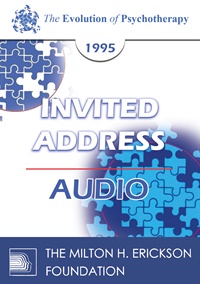
- Average Rating:
- Not yet rated
- Topic Areas:
- Invited Addresses | Existential Therapy | Therapeutic Relationship | Psychotherapy
- Categories:
- Evolution of Psychotherapy | Evolution of Psychotherapy 1995
- Faculty:
- Irvin Yalom, PhD | Miriam Polster
- Duration:
- 1:22:53
- Format:
- Audio Only
- Original Program Date:
- Dec 16, 1995
- Short Description:
- Existential psychotherapy is more properly viewed as a therapy informed by a sensibiity to existential issues, rather than as a discrete, self-contained school of therapy. It addresses the anxiety embedded in our consciousness of the parameters of existence, especially in our confrontation with death, meaninglessness, freedom, and isolation. I shall discuss these concerns, particularly those with the greatest relevance to everyday therapy practice. I shall discuss the implications of the existential sensibility for the conduct of therapy and the therapeutic relationship. Genuineness and authenticity are necessary.
- Price:
- $15.00 - Base Price
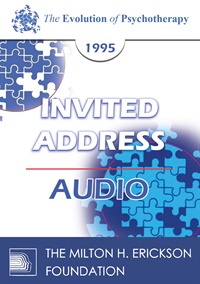
- Average Rating:
- Not yet rated
- Topic Areas:
- Invited Addresses | Focusing | Mind-Body | Psychotherapy
- Categories:
- Evolution of Psychotherapy | Evolution of Psychotherapy 1995
- Faculty:
- Eugene Gendlin, PhD | James Hillman, PhD
- Duration:
- 1 Hour 27 Minutes
- Format:
- Audio Only
- Original Program Date:
- Dec 16, 1995
- Short Description:
- Focusing is bodily attention, not to mere sensations but to an at first unclear, implicitly complex bodily sense-of a situation, problem, or aspect of life. Therapy deepens immediately with many clients if asked what physical sense comes in the middle of the body in relation to what is being worked on. With half a minute of repeated direct attention, clients can assign a "quality-word," e.g., "heavy," "fluttery," or "tight." Then small steps come to say the crux of the problem. Each brings a slight (later large) "shift" and release, a direct sense of validity, although further steps may again change the whole problem.
- Price:
- $15.00 - Base Price
Please wait ...

